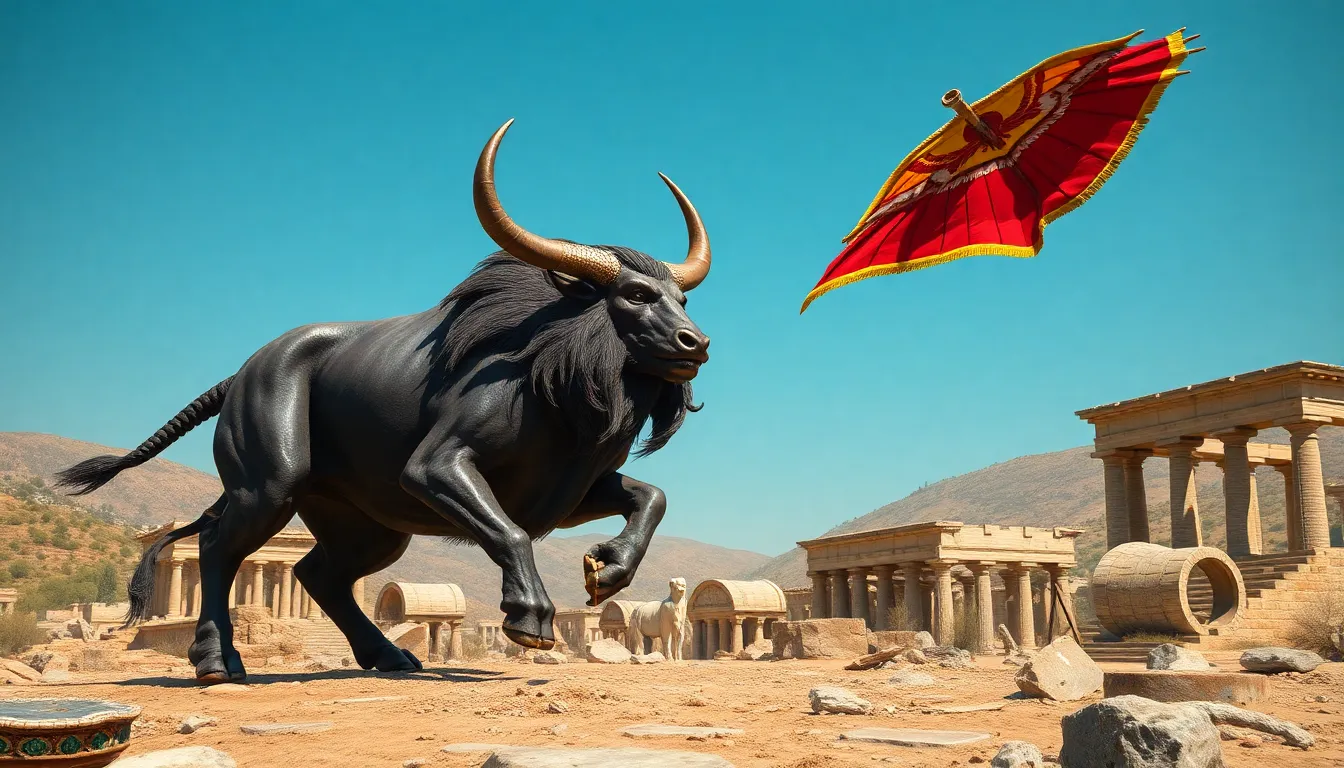The Minotaur: The Role of the Hero in Ancient Greek Myths
I. Introduction
The myth of the Minotaur is one of the most intriguing tales from ancient Greek mythology, encapsulating themes of heroism, sacrifice, and the struggle against monstrous forces. Central to this narrative is the figure of Theseus, a hero who embodies the qualities celebrated by the Greeks. The importance of heroism in ancient Greek culture cannot be overstated, as it served both as a model for personal conduct and a means of understanding the world through narratives of courage and valor. This article aims to explore the Minotaur myth, the nature of heroism within it, and the lasting impact of these stories on modern culture.
II. The Myth of the Minotaur
The origins of the Minotaur tale can be traced back to King Minos of Crete, who sought to display his power through a unique and terrifying creature. The Minotaur, a half-man, half-bull beast, was born from a union between Minos’s wife, Pasiphaë, and a majestic bull sent by Poseidon. To contain the Minotaur, Minos commissioned the architect Daedalus to create an elaborate Labyrinth, a complex maze from which escape was nearly impossible.
A. Key Characters
- Theseus: The heroic prince of Athens who ultimately confronts the Minotaur.
- Ariadne: The daughter of King Minos, who aids Theseus in his quest.
- The Minotaur: The monstrous entity that represents chaos and primal instincts.
In summary, the Minotaur’s role in Greek mythology extends beyond that of a mere monster; he symbolizes the darker aspects of humanity and the challenges that must be faced and conquered.
III. The Concept of the Hero in Ancient Greece
In Greek mythology, a hero is often defined as an individual of noble birth who possesses extraordinary abilities and qualities. These heroes typically engage in quests or adventures that test their character and strength.
A. Characteristics of Greek Heroes
- Courage: The willingness to confront danger and adversity.
- Strength: Both physical power and mental resilience.
- Honor: A commitment to uphold personal and societal values.
The significance of heroic deeds in ancient Greece was immense, as these stories served as moral examples, illustrating virtues such as bravery, loyalty, and the importance of fighting against injustice.
IV. Theseus: The Hero of the Minotaur Myth
Theseus, often regarded as one of the greatest heroes of Greek mythology, is the son of Aegeus, king of Athens. His lineage plays a crucial role in shaping his identity and motivations as a hero.
A. Theseus’s Journey to Crete
Motivated by a desire to rid Athens of the Minotaur and to rescue the youths sent as tributes to Crete, Theseus embarks on a perilous journey. The challenges he faces include navigating the treacherous seas, confronting the formidable Minotaur, and overcoming his own fears.
B. Key Traits Demonstrated by Theseus
- Bravery: He willingly enters the Labyrinth to face the Minotaur.
- Intelligence: With Ariadne’s help, he devises a plan to navigate the Labyrinth using a ball of thread.
- Leadership: He inspires his fellow Athenians and stands as a symbol of hope.
Theseus’s heroism exemplifies the ideals of ancient Greek culture, showcasing not only physical prowess but also mental acuity and moral integrity.
V. The Role of Women in the Minotaur Myth
Ariadne’s contribution to Theseus’s success is a significant aspect of the myth. She provides him with the means to navigate the Labyrinth, highlighting the collaborative nature of heroism.
A. Portrayal of Female Figures
In Greek mythology, women often play vital roles, influencing the course of events. However, they are also subjected to limitations dictated by their societal roles.
B. Interplay Between Heroism and Femininity
The interplay between heroism and femininity is evident in Ariadne’s character. Her intelligence and resourcefulness complement Theseus’s strength, emphasizing that heroism can manifest in various forms.
VI. Symbolism of the Minotaur and the Labyrinth
The Minotaur serves as a powerful symbol of chaos and darkness, representing the untamed aspects of human nature that must be confronted. The Labyrinth, on the other hand, symbolizes the complexities and challenges of life.
A. The Hero’s Journey
The hero’s journey often involves confronting and overcoming fears, which is exemplified by Theseus’s confrontation with the Minotaur. This theme resonates deeply, illustrating the universal struggle against inner demons and external threats.
VII. The Legacy of the Minotaur Myth in Modern Culture
The legacy of the Minotaur myth extends far beyond ancient Greece, influencing literature, art, and contemporary culture. Authors and artists continue to draw inspiration from its themes of heroism and the human condition.
A. Influence on Literature and Art
- Numerous adaptations in books, films, and plays.
- Artistic representations that explore the tension between man and monster.
B. Modern Interpretations of Heroism
Theseus’s journey inspires modern interpretations of heroism, emphasizing the importance of compassion, intelligence, and collaboration in overcoming challenges.
C. Continued Relevance
The Minotaur story remains relevant in contemporary discussions about the nature of heroism, the role of women, and the necessity of facing one’s fears in the pursuit of personal growth and societal advancement.
VIII. Conclusion
In conclusion, the Minotaur myth serves as a rich tapestry of heroism, exploring the multifaceted nature of courage and the challenges faced by those who seek to overcome darkness. The enduring significance of heroic narratives is evident in their ability to resonate across time, offering lessons about bravery, intelligence, and the importance of collaboration. Ultimately, the story of Theseus and the Minotaur teaches us that heroism is not just about individual triumph but also about the connections we forge and the challenges we face together.




